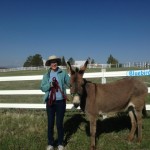I’ve spent my whole life riding and training horses. I was always generally happy with the job I did training my horses. But as in software development, thought leaders in horse behavior have discovered better training techniques. And just as I always strive to learn better ways to deliver magnificent software, I also work with expert horse and donkey trainers to hone my equine training skills.
Today, my donkey trainer, Tom, helped me with some issues I’ve had with my donkeys. He pointed out that as prey animals, donkeys don’t respond well to predator behavior. Say I’m leading Marsela, and she stops to eat some grass. If I also stop, move towards her, and jerk on the lead rope, I’m mimicking what a predator might do. That isn’t going to inspire a good reaction in my donkey.
It’s much more effective (as Tom demonstrated) to keep walking, but make it exceedingly uncomfortable while Marsela’s head is down in the grass. That way, deciding to not try to eat grass is her own idea. She can eat grass and be uncomfortable, or not eat grass and be left alone. My habit is so ingrained, I found it almost impossible to not stop and move towards my donkey. Yet, this does NOT work!
In my experience, people developing software fall into the same trap. Here’s an example. I worked on a team whose managers talked a lot about agile, but where chaos still prevailed. I got an opportunity to apply agile principles to one critical project. The project was a complete success. I thought, hey, now we will get to try this on our normal development process! But a busy time period was upon us, and everyone panicked and reverted to the same old habits that didn’t work.
Falling into comfortable habits, even when they don’t deliver success, is apparently human nature. I suppose that’s why my sister can’t quit smoking. I don’t understand why we humans do this to ourselves. But every time my donkey puts her head down to eat and I stop, step towards her and jerk on the lead rope, I remember that this is NOT what will help my donkey walk willingly with me without grazing!
Nevertheless, I will keep practicing until the new habit of continuing to walk, while making it quite uncomfortable for the donkey to graze, and hopefully it will become my new habit. Same with software development – we have to practice new, more effective habits until they are second nature to us. Don’t beat yourself up for falling back into comfy old habits – but do keep pushing yourself to adopt the new, more successful ones.


One comment on “Old habits die hard – even when they don’t work!”
This is touching on a really interesting point, as a human-animal pairing, your trainer is asking you, as a leader, to understand the mindset of your donkey, and to modify your behaviour in such a way as the animal will respond better to it.
When you think about it, it makes perfect sense. However how often do people try to impose their will when leading and expect those they lead to adapt to them. With yourself and the donkey, you can adapt to Marsela’s worldview much easier than she can to yours.
I think with ourselves and testers and other disciplines, the gulf of understanding between us can be as vast as between trainer and donkey. The only long term winning move is to win them over by trying to understand their worldview of you, to engage and challenge that, but in a way they can respect over being threatened.
It’s shocking that the word “co-location” can be as simple a method to really undermine that gulf and try to bring people together in software teams. Simply sharing frustrations, victories, life can remove the feeling of “predator” when the tester comes to speak to the devs.